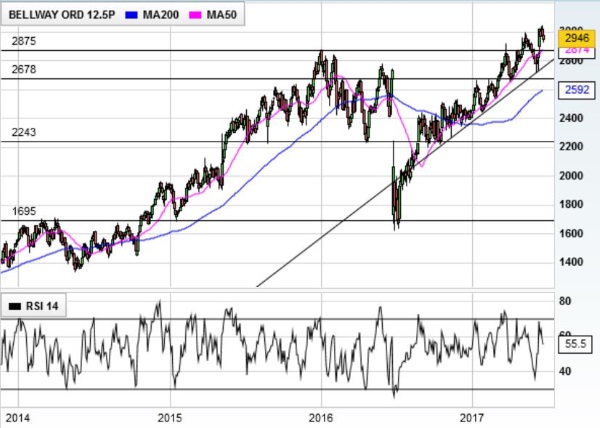A best-in-class housebuilder with 20% upside
22nd June 2017 11:39
by David Brenchley from interactive investor
Share on
Smashed by last summer's Brexit vote, big name investors like Neil Woodford and Mark Slater have been piling into housebuilders again recently. They've seriously outperformed the wider market in 2017, too, but which one is best buy right now?
In the past six months, the FTSE All-Share index is up 6%. Not bad. But big-hitters like and are up 27% and 22%, respectively. Even stragglers and are up 16%.
is somewhere in the middle, but broker UBS has weighed in and rates the mid-cap operator its top pick.
The Newcastle-upon-Tyne-based developer last week shot to a record high above £30 after raising forecasts for its full-year. In a trading update, it said demand in the four months to 4 June 2017 was strong, upgrading expectations for growth in housing completions in the year ending July from 5% to 10%.
Meanwhile, operating margin should be in excess of 22%, compared to 22% in 2016, and it's well on track to meet next year's land plot growth target.
We mentioned at the time of the update that UBS was already bullish, with a price target which implied 10% upside.

However, it's gone back to the drawing board and hiked its price objective –modelled on discounted cash flow and assuming a long-term adjusted return on capital employed (ROCE) of 16% and weighted average cost of capital of 9% - by 9% to 3,530p – giving potential gains of 20%.
Considering the shares are already up over three-quarters since its post-Brexit vote low, that's a big vote of confidence. FTSE 250-listed Bellway trades on a forecast 2018 price/earnings (PE) ratio of just 7.7 times versus a sector average of 8.4 times, and a price/tangible net asset value (P/TNAV) of 1.5 times, compared to 1.5 for the sector.
Analyst Miguel Borrega updates earnings per share (EPS) guidance for the current year by 5%, by 7% for 2018, then by double-digits for the following two years.
This showcases "an exceptionally strong product mix," he says, with an equally spread regional positioning. Bellway is particularly strong in the North of England compared with its peers.
"Bellway has been consistently delivering positive earnings momentum and we do not think the shares sufficiently discount what we think is the best balanced growth story in the sector.
"While we expect some uncertainty over the coming quarters as a result of the recent general election and as the UK starts negotiations to exit the EU, we believe the highly attractive Help-to-Buy programme continues to provide a significant incentive to buy a new build property (35% of Bellway's volumes)."
UBS's investment thesis is predicated on three key pillars, which remain unchanged. These are the fact that Bellway is positioned at the affordable end of the market, leaving it more resilient to price changes; it has a strong track record of sector-beating margins/ROCE and low gearing; and that it is an overly discounted growth story.
This is backed up by a forecast dividend yield of 4.1% for 2017 –below the sector average of 6.1% - reaching 5% in a few years' time.
Despite a strong balance sheet that could "comfortably accommodate" dividend cover lower than the current three times EPS, Borrega reckons the firm will continue to prioritise new land acquisitions over substantial dividend increases.
The broker says risk to the current share price of 2,937p is skewed to the upside and has slapped a blue-sky prediction of £44 on the stock. That assumes Bellway sees a compound annual growth rate in volume and average selling price of 6.7% and 2.4% respectively over FY16-19, leading to an operating margin of 23% by 2029.
"Combining this with better capital turn assumptions due to increased WIP turn or a shorter landbank in our DCF valuation, and flexing our terminal ROCE (land creditor and calendar adjusted) to 17% would imply fair value of 4,400p."
This article is for information and discussion purposes only and does not form a recommendation to invest or otherwise. The value of an investment may fall. The investments referred to in this article may not be suitable for all investors, and if in doubt, an investor should seek advice from a qualified investment adviser.